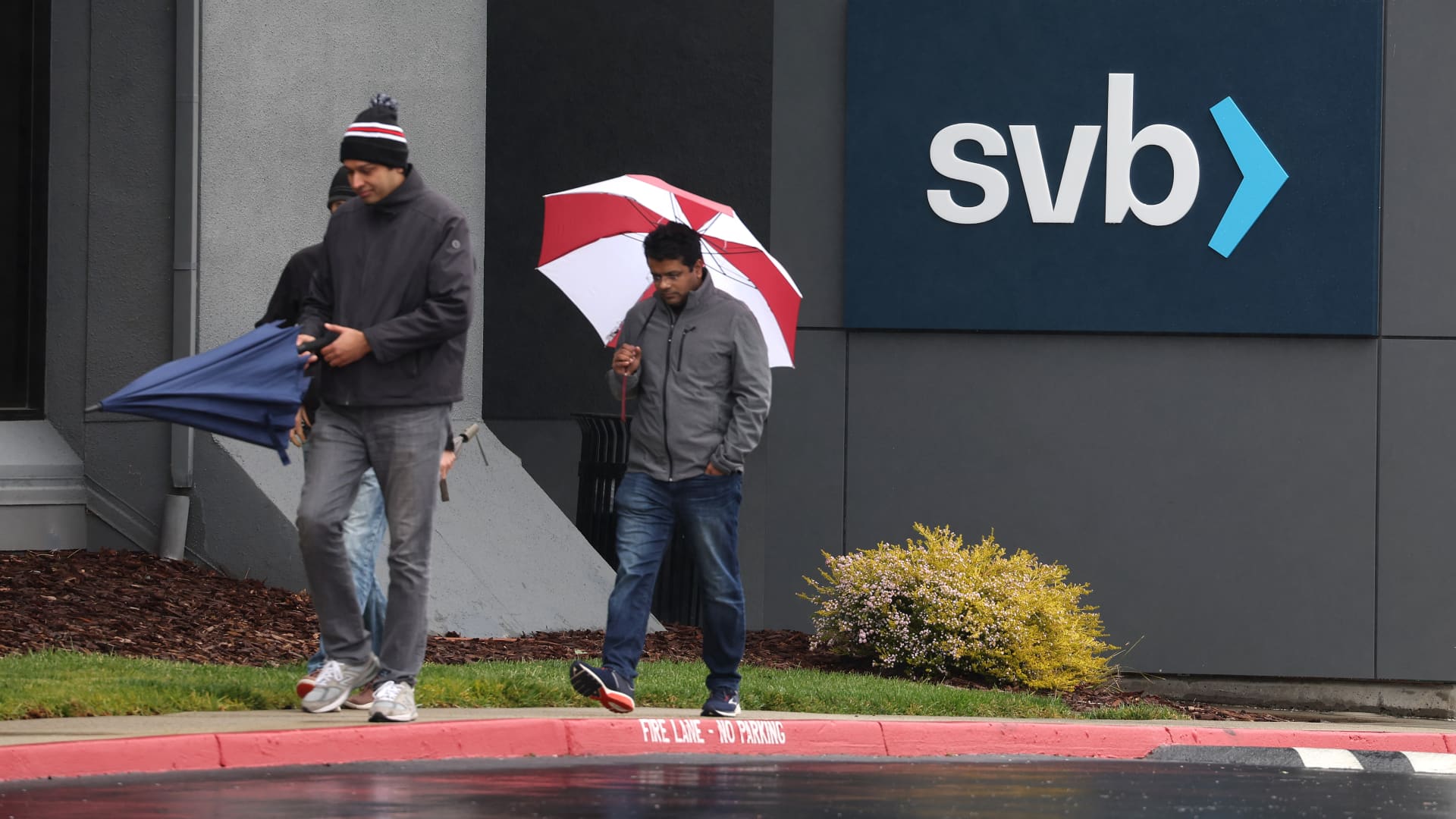EPOCH TIMES
Finance Sector Braces for Shockwaves After Silicon Valley Bank Collapse
Nearly 86 percent of the bank's customer deposits were believed to be uninsured
A customer stands outside of a shuttered Silicon Valley Bank (SVB) headquarters in Santa Clara, Calif., on March 10, 2023. (Justin Sullivan/Getty Images)
A customer stands outside of a shuttered Silicon Valley Bank (SVB) headquarters in Santa Clara, Calif., on March 10, 2023. (Justin Sullivan/Getty Images)
Andrew Moran
By Andrew Moran
March 10, 2023Updated: March 11, 2023
biggersmaller Print
It took only 48 hours for Silicon Valley Bank to become the nation’s second-largest bank failure.
The company’s problems started on Wednesday when the financial institution informed investors that it needed to generate $2.25 billion to cover an unexpected decline in deposits and improve its balance sheet and overall financial position.
In a letter to shareholders, the bank’s parent company, SVB Financial Group, reported that the rising-rate environment and slowing economy applied pressure to public and private markets. It further explained that clients endured enormous cash burn levels (net decrease in cash over time).
This revelation erased approximately $10 billion in market capitalization in a single trading session, as the stock tanked 65 percent to $106. In after-hours trading on Friday, shares plunged another 60 percent. SVB Financial bonds also cratered to 31 cents on the dollar.
Founded in 1983, the bank is a top Silicon Valley lender based in Santa Clara, California. The sudden failure of SVB has created uncertainty among tech investors and startups who had large exposure to the bank.
The primary reason for the bank’s demise, according to industry analysts, was that it heavily invested customer deposits in treasury bonds, which are highly sensitive to interest rates.
“There is no question that SVB is in a cash crisis because of its over exposure to the tech sector,” said Chenxi Wang, the founder and general partner of Rain Capital, in a note. “The bank also made balance sheet management errors by putting too much money into long-term bonds, which became a problem when interest rates surged. This, coming on the heels of the Silvergate Bank liquidation, caused non-trivial panic.”
Silicon Valley
An employee gets into his car after arriving to work to a shuttered Silicon Valley Bank (SVB) headquarters in Santa Clara, Calif., on March 10, 2023.
The lack of capital and the clarion call across Silicon Valley and social media initiated a bank run, as clients withdrew an enormous $42 billion of deposits on Thursday. By the close of business, SVB maintained a negative cash balance of $958 million, according to a filing from the Department of Financial Protection and Innovation of the State of California.
CEO Greg Becker cashed out stock and options for a $2.27 million profit weeks before Friday’s collapse, a Securities and Exchange Commission (SEC) filing revealed.
The bank is the 16th largest in the United States, with $209 billion in assets as of Dec. 31, according to the Federal Reserve.
As California banking regulators shuttered SVB, it became the largest bank to fail since the 2008 financial crisis when Washington Mutual collapsed.
“The precipitous deposit withdrawal has caused the Bank to be incapable of paying its obligations as they come due,” the California financial regulator stated. “The bank is now insolvent.”
Uninsured Deposits
The Federal Deposit Insurance Corporation (FDIC) took over the financial institution and renamed it the “Deposit Insurance National Bank of Santa Clara.”
The bank’s main office and all 13 branches in California and Massachusetts will reopen on Monday, the FDIC announced in a press release.
Silicon Valley Bank had approximately $209.0 billion in total assets and roughly $175.4 billion in total deposits as of December 31, according to the FDIC.
“At the time of closing, the amount of deposits in excess of the insurance limits was undetermined,” the FDIC said. “The amount of uninsured deposits will be determined once the FDIC obtains additional information from the bank and customers.”
However, the bank’s operations account for a significant portion of SVB Financial Group’s financial statements. According to the parent company’s 2022 annual report (pdf), the estimated amount of uninsured deposits in U.S. offices that exceeded the FDIC insurance limit was $151.5 billion as of December 31. Based on this figure, nearly 86 percent of the deposits were uninsured at the end of last year.
Who Will Bail Out SVB?
The SVB failure has the U.S. financial sector on edge, industry observers say.
Will the government bail out the company, or will a private bank come to its rescue?
Billionaire investor and hedge fund manager Bill Ackman thinks a government bailout “should be considered” to prevent a domino effect in the financial industry.
Bill Ackman
Bill Ackman, CEO of Pershing Square Capital, speaks at the Wall Street Journal Digital Conference in Laguna Beach, Calif., on Oct. 17, 2017. (Mike Blake/Reuters)
“The failure of @SVB_Financial could destroy an important long-term driver of the economy as VC-backed companies rely on SVB for loans and holding their operating cash,” he said via Twitter on Thursday. “If private capital can’t provide a solution, a highly dilutive gov’t preferred bailout should be considered.”
He believes that any state-led bailout should go toward the depositors rather than management or equity holders, adding that improper risk management should not be rewarded.
“The risk of failure and deposit losses here is that the next, least well-capitalized bank faces a run and fails and the dominoes continue to fall. That is why gov’t intervention should be considered,” he said.
But Zack Ellison, the founder of venture debt investment firm Applied Real Intelligence, thinks a large bank will purchase SVB “to restore confidence.”
“The buyer would be getting a steal considering SVB’s prominence in the technology and innovation communities,” Ellison told The Epoch Times. “SVB has far greater relevance in Silicon Valley than its closest competitors and has access to VCs and founders that every bank craves.”
Silicon Valley Bank Shut Down By Regulators
People line up outside of the shuttered Silicon Valley Bank (SVB) headquarters in Santa Clara, Calif., on March 10, 2023. (Justin Sullivan/Getty Images)
JPMorgan Chase could be the most likely candidate to swoop in and place a bid for SVB since the big bank has grown its venture lending business, Ellison said.
Others assert this could be a sign of trouble brewing in the sector, especially after the California-based and cryptocurrency-focused lender Silvergate Bank announced it would be winding down operations and beginning the liquidation process due to inadequate capitalization.
Other Banks Suffer Losses
Investors also panicked about several individual bank stocks that market analysts warned share some of SVB’s similarities. At the end of the trading week, PacWest Bancorp crashed nearly 38 percent, First Republican slumped about 14 percent, and Western Alliance Bancorp declined more than 20 percent (in after-hours trading, shares tumbled another 2.7 percent).
That said, even stocks in the big banks, such as the Bank of America, Citigroup, and Wells Fargo, suffered notable losses on Thursday, wiping out tens of billions of dollars in market value.
Streaming platform Roku slipped close to 1 percent after revealing that more than a quarter of its cash and cash equivalents were deposited at SVB, confirming that it “does not know to what extent the Company will be able to recover its cash on deposit at SVB.”
Because of concerns over a widespread contagion effect, there is a belief that the Federal Reserve might raise interest rates by 25 basis points instead of the widely anticipated half-point. Since tightening credit conditions were one of the reasons behind SVB’s downfall, another quarter-point increase to the benchmark federal funds rate could be a reality.
Still, according to the CME FedWatch Tool, investors are mostly penciling in a half-point rate hike.
White House officials confirmed that the administration is monitoring the situation.
Treasury Secretary Janet Yellen met with officials at the Fed, FDIC, and the Office of the Comptroller of the Currency on Friday.
“Secretary Yellen expressed full confidence in banking regulators to take appropriate actions in response and noted that the banking system remains resilient and regulators have effective tools to address this type of event,” the Treasury Department said in a statement.
Cecilia Rouse, the head of the Council of Economic Advisers (CEA), assured reporters that the banking system is vastly different from where it was during the 2008 financial crisis.
“Our banking system is far more resilient than it was in 2008. We’ve learned a lot. We’ve got better tools,” she said at a press briefing on Friday. “We put in guardrails, and our regulators have much visibility into the banking sector than they did a decade ago.”
Not everyone is keen on having the federal government potentially intervene and bail out the bank.
Rep. Matt Gaetz (R-FL) tweeted Friday evening that he would “not support a taxpayer bailout of Silicon Valley Bank.”


